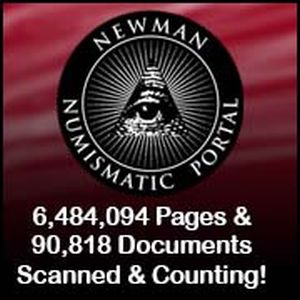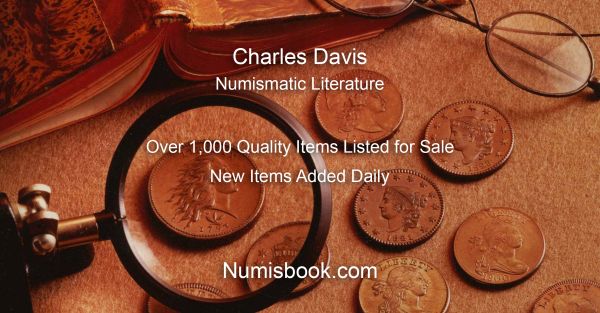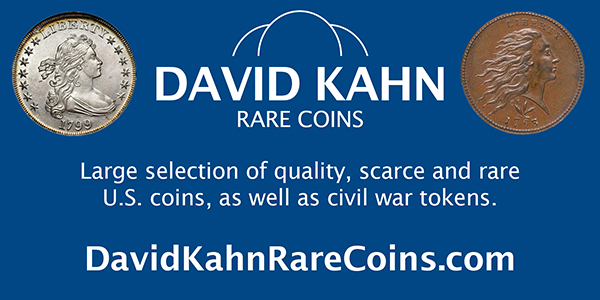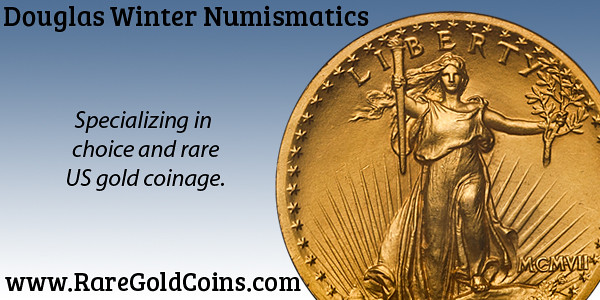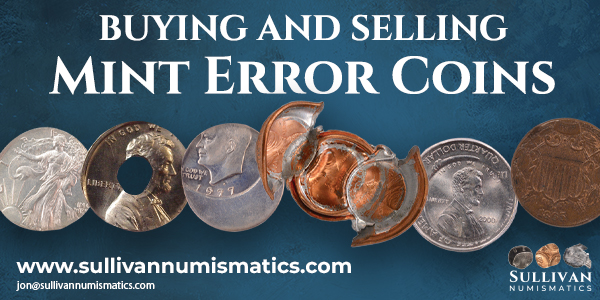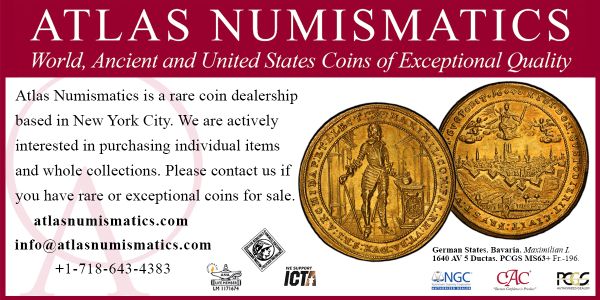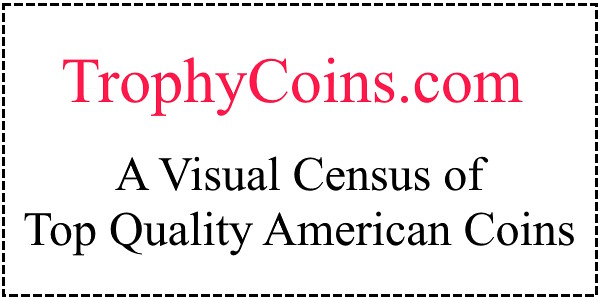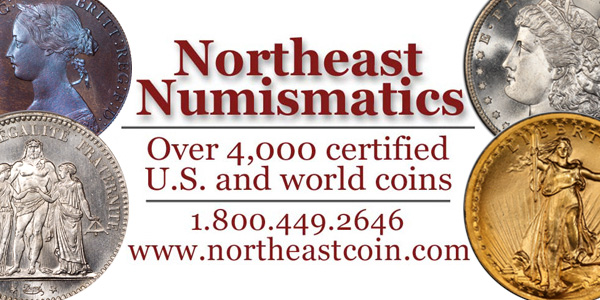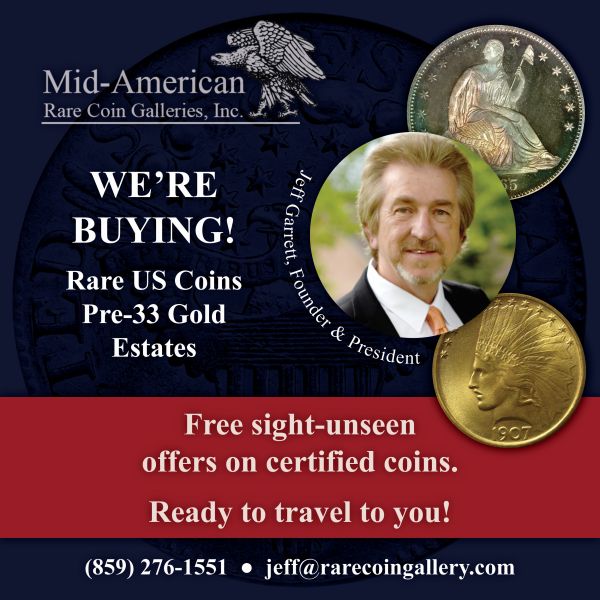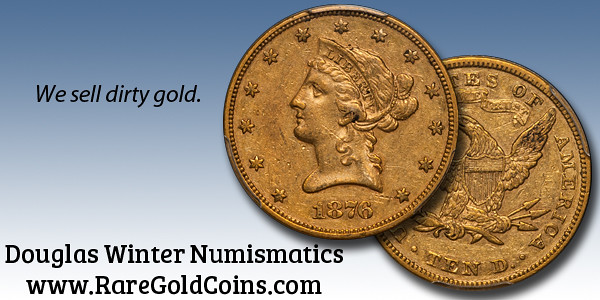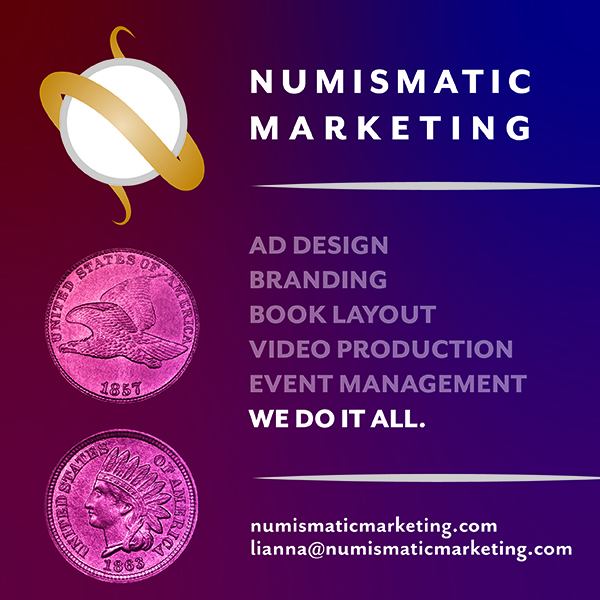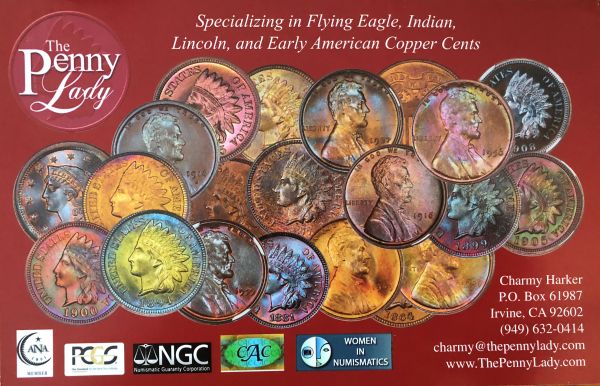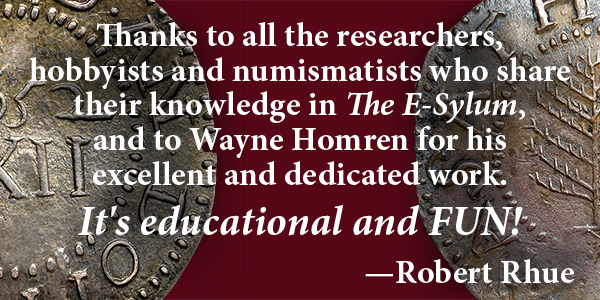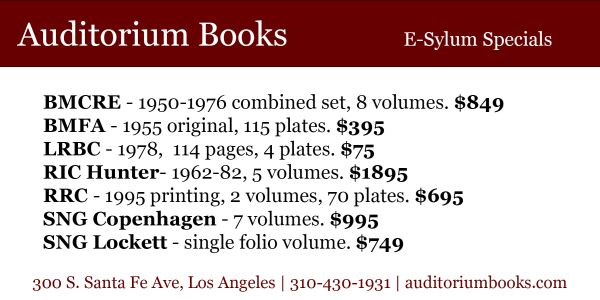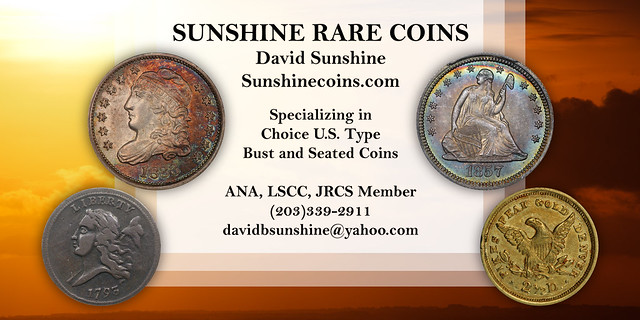
Visit our NBS Sponsors



About UsThe Numismatic Bibliomania Society is a non-profit association devoted to the study and enjoyment of numismatic literature. For more information please see our web site at coinbooks.org SubscriptionsThose wishing to become new E-Sylum subscribers (or wishing to Unsubscribe) can go to the following web page link MembershipThere is a membership application available on the web site Membership Application To join, print the application and return it with your check to the address printed on the application. Print/Digital membership is $40 to addresses in the U.S., and $60 elsewhere. A digital-only membership is available for $25. For those without web access, write to: Jeff Dickerson, Treasurer AsylumFor Asylum mailing address changes and other membership questions, contact Jeff at this email address: treasurer@coinbooks.org SubmissionsTo submit items for publication in The E-Sylum, write to the Editor at this address: whomren@gmail.com BUY THE BOOK BEFORE THE COINSale Calendar
|
- WAYNE'S WORDS: THE E-SYLUM NOVEMBER 24, 2024
- ASYLUM WINTER 2024 ISSUE PUBLISHED
- ABOUT THIS ISSUE: NOVEMBER 24, 2024
- GUT-LYNT AUCTION 19 LITERATURE LOTS
- COMPREHENSIVE CATALOG OF 3C PATTERNS
- VIDEO: COUNTERFEIT COINS FROM CHINA
- CHRISTIAN GOBRECHT HEADSTONE DEDICATION
- NOTES FROM E-SYLUM READERS: NOVEMBER 24, 2024
- ANA'S MONEY IN THE U.S. VIRTUAL TOUR
- ANA AWARD NOMINATIONS REQUESTED
- VOCABULARY TERM: PUNCH PRESS
- THE GOLD COIN CLUB BUILDING
- DR. LAWRENCE LEE INTERVIEW, PART TWO
- WORKS OF SCULPTOR JULIO KILENYI
- NUMISMAGRAM MEDAL SELECTIONS: NOVEMBER 24, 2024
- HERITAGE NOVEMBER 2024 TOKENS & MEDALS
- THE WISDOM COLLECTION OF RENAISSANCE MEDALS
- WAYNE'S NUMISMATIC DIARY NOVEMBER 24, 2024
- MILWAUKEE SOCIETY 90TH ANNIVERSARY MEDAL
- HOW TO (ROUGHLY) DATE A NOTE
- VICTORIA CANADA 1870 $2 BANKNOTE DISCOVERY
- A GREEK SHORT SNORTER
- HIGH INFLATION IN ARGENTINA
- LOOSE CHANGE: NOVEMBER 24, 2024
Content presented in The E-Sylum is not necessarily researched or independently fact-checked, and views expressed do not necessarily represent those of the Numismatic Bibliomania Society.
WAYNE'S WORDS: THE E-SYLUM NOVEMBER 24, 2024
 New subscribers this week include:
Julio Castano, courtesy Bob Van Arsdell;
Curt Gammer, courtesy Julian Leidman, and
James McHugh.
Welcome aboard! We now have 7,258 subscribers.
New subscribers this week include:
Julio Castano, courtesy Bob Van Arsdell;
Curt Gammer, courtesy Julian Leidman, and
James McHugh.
Welcome aboard! We now have 7,258 subscribers.
Thank you for reading The E-Sylum. If you enjoy it, please send me the email addresses of friends you think may enjoy it as well and I'll send them a subscription. Contact me at whomren@gmail.com anytime regarding your subscription, or questions, comments or suggestions about our content.
What with compiling and writing my Diary article and handling chores at home, I was unable to get through all of the week's email. If you submitted something, hang tight and I should get to it by next week's issue. We're not traveling for the holiday. Happy Thanksgiving to all our U.S. readers.
This week we open with NBS news, a numismatic literature sale, one new book, updates from the Newman Numismatic Portal, the Christian Gobrecht headstone dedication, notes from readers, and more.
Other topics this week include three cent patterns, ANA news, the Gold Coin Club, Julio Kilenyi, fixed price and auction offerings, my numismatic diary, and a number of banknote stories.
To learn more about J.D. Ferguson, Guido Crapanzano, Coin Columnists, medals relating to architects, counterfeit coins from China, the Stolen Stella, why numismatics did not become an academic profession in the U.S., the Sigmund Freud medal, the medal of Immortality, the U.S Mint Braille Education Set, advertising notes, credit cards, and a Greek short snorter, read on. Have a great week, everyone!
Wayne Homren
Editor, The E-Sylum
ASYLUM WINTER 2024 ISSUE PUBLISHED
The Winter 2024 issue of The Asylum is on the way from our sponsor, the Numismatic Bibliomania Society. -Editor
 Welcome to The Asylum's Winter 2024 edition.
Welcome to The Asylum's Winter 2024 edition.
In this issue:
- "J.D. Ferguson: A Bibliographical Tribute" By Darryl A. Atchison, F.C.N.R.S.
- "Guido Crapanzano, an Extraordinary Man" By Stefano Poddi
- "An Incomplete Listing of Coin Columnists" By Pete Smith
Message from NBS President Len Augsburger
Welcome to the Winter issue of The Asylum. While there is nothing quite as pleasant as the scent of a book-filled room, it's appropriate that we acknowledge our electronic publication, the E-Sylum, which celebrated its 26th anniversary on September 4. In a rapidly evolving digital age, an online periodical lasting for 26 years is a rare bird, and congratulations to Editor Wayne Homren for the weekly production of the E-Sylum are much in order. Wayne wears many hats as editor, handling everything from editorial to advertising to IT. Wayne has built the circulation to a whopping 7,000 readers, and more so has created a community that continually informs itself with fresh and compelling content.
ABOUT THIS ISSUE: NOVEMBER 24, 2024
Last week we introduced a new footer article with bios of E-Sylum editors, contributors, and technical supporters. Here we are. I really ought to update my profile photo - it's an old (young?) one from 2017. But I figure, how old can it be? - I still have that shirt. What I don't have anymore is a lack of grey hair. -Editor
GUT-LYNT AUCTION 19 LITERATURE LOTS
Gut-Lynt will be hosting their 19th Auction on November 30 and December 1. Here's their announcement and some selected numismatic literature lots. -Wayne and Garrett
Dear collectors and friends of numismatics!
Our Gut-Lynt Auction 19 has been online for a few days and pre-bids are now possible.
On the weekend of 30 November and 1 December, we will be offering over 2500 lots of coins and medals from the Ancient World to the present time, including 350 lots of numismatic literature and 500 lots of banknotes. The auctions will start at 10:00 am, each day.
The Gut-Lynt Auction 19 will start on Saturday, 30 November at 10:00 a.m. (CET) with more than 500 coins from the Ancient World.
Following the ancient coins will be a series of c. 500 banknotes from various collections starting around 2.00 pm (CET). Of particular interest is a collection of emergency notes relating to Mecklenburg-Strelitz and Neubrandenburg with many rarities, such as rye money in numerous variations, up to the 100 centner issue.
COMPREHENSIVE CATALOG OF 3C PATTERNS
The latest addition to the Newman Numismatic Portal is Michael Bourne's new book on three cent patterns. Project Coordinator Len Augsburger provided the following report. -Editor
Michael Bourne Publishes Research on the 3-cent Pattern Series
 Documenting a nearly 50-year quest, Michael Bourne's Comprehensive Catalog of 3c Patterns serves not only as the definitive catalog of the U.S. 3-cent pattern series, but also chronicles the formation of this important father-and-son collection. The U.S. Mint produced nearly a hundred different 3-cent patterns (including the off-metal strikes), dated 1849 to 1885. Bourne provides commentary for each issue, presents an extensive list of market appearances, and lists the finest known pieces. This is no mere recitation of auction catalog listings drawn from online resources, but rather a deep exploration of the literature than has uncovered examples in fixed price lists, private collections, and institutional cabinets.
Documenting a nearly 50-year quest, Michael Bourne's Comprehensive Catalog of 3c Patterns serves not only as the definitive catalog of the U.S. 3-cent pattern series, but also chronicles the formation of this important father-and-son collection. The U.S. Mint produced nearly a hundred different 3-cent patterns (including the off-metal strikes), dated 1849 to 1885. Bourne provides commentary for each issue, presents an extensive list of market appearances, and lists the finest known pieces. This is no mere recitation of auction catalog listings drawn from online resources, but rather a deep exploration of the literature than has uncovered examples in fixed price lists, private collections, and institutional cabinets.
Judd, Davis, Adams-Woodin, and Pollock numbers are all cross-referenced. Bourne would have been more than justified in renumbering the entire series, but, with respect to Dr. Judd, he has instead suggested a set of changes to future editions of the Judd reference. As such, this work will be an indispensable companion to Judd's United States Pattern Coins.
VIDEO: COUNTERFEIT COINS FROM CHINA
The David Lisot Video Library on the Newman Numismatic Portal can be found at:
https://nnp.wustl.edu/library/multimediadetail/522852
We highlight one of his videos each week in The E-Sylum. Here's one from 2009 with Ron Guth speaking on the emerging threat of counterfeit coins from China. Still an issue here in 2024. -Editor
CHRISTIAN GOBRECHT HEADSTONE DEDICATION
Liberty Seated Collectors president Len Augsburger passed along this press release about the recent unveiling ceremony of the new headstone for the third Chief Engraver of the U.S. Mint, Christian Gobrecht. -Editor
Sponsored by the Liberty Seated Collectors Club (LSCC), a new headstone was placed at the Christian Gobrecht grave at Lawnview Cemetery in Rockledge, PA, on November 13. In attendance were LSCC members, U.S. Mint personnel, and descendants of the Gobrecht family. Benjamin Franklin, in the person of Pat McBride, was present, while the American Numismatic Society was represented by Resolute Americana Curator Jesse Kraft.
NOTES FROM E-SYLUM READERS: NOVEMBER 24, 2024
On the Stolen Stella
Regarding the $4 gold Stella stolen from the Douglas Weaver Rare Coins Shop in Waco, Texas,
Julian Leidman writes:
"The $4 gold belonged to me and my colleague, Mike Brownlee of Dallas, and we had consigned it to them. I don't think it was ever recovered, but I think that we were paid by the insurance company."
Interesting - thanks for the background. -Editor
To read the earlier E-Sylum article, see:
COIN DEALER TEDDY KEITH THRUSH
(https://www.coinbooks.org/v27/esylum_v27n46a13.html)
Other topics this week include Japan's Ceramic Ghost Coins, and the JEL Recreative Token. -Editor
ANA'S MONEY IN THE U.S. VIRTUAL TOUR
In a November 18, 2024 press release, the ANA discussed its Money Museum virtual tours. -Garrett
 Learn about America's rags-to-riches story with interactive, detailed, close-up views of rare artifacts and coins. Visit the Americana Gallery 360-degree virtual tour to delve into an immersive and engaging educational experience on American numismatics. The tour can be viewed from any preferred device – phone, desktop, laptop, tablet, and more.
Learn about America's rags-to-riches story with interactive, detailed, close-up views of rare artifacts and coins. Visit the Americana Gallery 360-degree virtual tour to delve into an immersive and engaging educational experience on American numismatics. The tour can be viewed from any preferred device – phone, desktop, laptop, tablet, and more.
View beautiful, high-resolution photographs of the objects on display, watch informational videos, and listen to audio insights from Money Museum Curator Doug Mudd and Assistant Curator Caroline Turco. Take the tour at money.org/americana-gallery-vrtour.
The gallery, on display at the Edward C. Rochette Money Museum, tells the story of the early English colony, which began with limited resources but grew into the world's richest economy. Prized treasures, such as the 1933 eagle (gold $10); a rare 1855 Wass, Molitor & Company $50 California Territorial Gold piece; and a beautiful 1915 Panama Pacific Exposition commemorative set, unravel the deep ties between national money and the nation's history.
ANA AWARD NOMINATIONS REQUESTED
The ANA is requesting nominations for its yearly slate of awards that recognize significant contributions to numismatics. -Garrett
 Each year, the American Numismatic Association (ANA) presents awards to deserving individuals in recognition of outstanding dedication to numismatics. The ANA is now accepting individual nominations for 2025 awards and Numismatic Hall of Fame "Modern Era" candidates.
Each year, the American Numismatic Association (ANA) presents awards to deserving individuals in recognition of outstanding dedication to numismatics. The ANA is now accepting individual nominations for 2025 awards and Numismatic Hall of Fame "Modern Era" candidates.
All nominations can be submitted in writing and online – 300 words or more for the Numismatic Hall of Fame, and 50-100 words for all other awards. Include the date of submission, the nominee's name, background information and birth date (if known). Nominations are accepted through January 15, 2025.
VOCABULARY TERM: PUNCH PRESS
Here's another entry from Dick Johnson's Encyclopedia of Coin and Medal Terminology. -Editor
Punch Press. A press deriving its force from a ram moving up and down, delivering a sharp brief blow for shaping, cutting and trimming metalworking procedures. Small objects, less than three-quarters of an inch can be diestruck on a punch press, but generally they do not deliver enough force to strike larger or relief items like coins and medals. Most blanking – of any gauge material, size and shape – is done on punch presses. Also all mechanical trimming, particularly for all medallic work, is done on punch presses (unless the trimming is done by hand). All large presses are power operated, however, some small presses are operated manually, as a kick press, which can blank up to 1/2-inch, or trim up to 1 1/2-inch. Medals with a lug typically are trimmed on such a manual press (the lug is made into a LOOP afterwards). Essentially a knuckle-joint press is a punch press of great power, modified to deliver a squeeze during striking with extrusion dwell (preventing the metal from springing back by molecular memory). See presses and press room practices.
THE GOLD COIN CLUB BUILDING
E-Sylum Feature Writer and American Numismatic Biographies author Pete Smith submitted this article on the Gold Coin Club of Victor, Colorado. Thanks! -Editor
Last week I mentioned finding a story while looking for something else. This week I was attempting to identify what coin club had their own building. The Tidewater (VA) Coin Club established a building fund in 1965. I don't know what became of that. Currently the club meets at the Norfolk VFW Post.
The Gold Coin Club Building in Victor, Colorado, was not built for a numismatic club. It relates more to the related field of gold mining history. The building was constructed for workers at the Gold Coin Mine. The club was incorporated on January 17, 1899, and built at a cost of $10,000.
DR. LAWRENCE LEE INTERVIEW, PART TWO
Greg Bennick's latest interview for the Newman Numismatic Portal is with museum curator and academic Dr. Lawrence Lee. Here's the second part, where Larry talks about why numismatics did not become an academic profession, using a comparison with geology as an example. -Garrett
GREG BENNICK: The combination of science and theory here gives us a lot to talk about, especially because while most people would likely agree that the young numismatist is the future, what you're saying from a scientific approach is essentially show me the money, and show me the studies.
DR. LAWRENCE LEE: Yeah, show me a study. The more information, the better off.
GREG BENNICK: So, with that in mind, I wanted to talk about your taking of an academic approach to the hobby as this certainly ties into that. While I am not a traditional academic, I tend to run in those circles due to research I have been doing for a book on a cultural anthropologist who was rooted in psychology and philosophy. I was really interested when I read your "Rethinking Education" article and how numismatic education might work in the current education system of the United States. I would love to know about that article. Maybe you could tell listeners about that article and then maybe amidst that, we could talk about this idea: did numismatics ever hold a position of revered status in the USA as an academic discipline?
 DR. LAWRENCE LEE: Okay. That was a mouthful, but it's a really thoughtful, deep mouthful! It comes down to this question. Why are there no such things as experts from a legal standpoint in numismatics? There are no coin experts in the United States, at least from a degreed standpoint. In other words, there's no degree that you can point to that says, "Oh, I went to this school and got this PhD in this numismatic class. And so, I can now be an expert like this doctor or this lawyer is an expert because of their degree."
DR. LAWRENCE LEE: Okay. That was a mouthful, but it's a really thoughtful, deep mouthful! It comes down to this question. Why are there no such things as experts from a legal standpoint in numismatics? There are no coin experts in the United States, at least from a degreed standpoint. In other words, there's no degree that you can point to that says, "Oh, I went to this school and got this PhD in this numismatic class. And so, I can now be an expert like this doctor or this lawyer is an expert because of their degree."
In other words, how has numismatics reverted to just being about coin collecting? How did we go backwards on this scale? Because there was a time in the 1860s, just when the observational sciences were first starting to form - geology, archaeology, and numismatics were starting to form into actual academic disciplines - where we could have continued on and become like geology and archaeology today, or like numismatics is in Europe, where it's part of the art or the archaeology department, and it's possible to get a PhD or a Master's in Numismatics in those academic settings. But not in America. There is not even a single high school class taught in coin collecting that is recognizable on the next level up, except as an elective. Well, instead of the chess club, you joined the coin club, and okay, you get extra credit.
WORKS OF SCULPTOR JULIO KILENYI
Research rabbit holes are a delightful journey of discovery and learning. Author Jim Haas recently followed a thread relating to sculptor Julio Kilenyi, kicked off by a newspaper article about medals produced for the Consolidated Gas Company of New York. Here's his summary. -Editor
Julio Kilenyi was born in Arad, Hungary, part of the Austro-Hungarian Empire, in 1885. He studied at the city's Royal Art School, later in Germany, France and South America before coming to America, arriving on December 17, 1915 from Buenos Aires. For reasons unknown, his petition for citizenship reads, "also known as Costao Petrone." He became a citizen on April 1, 1917. His works, of which there are many, include the Harry S. Truman Inaugural Medallion, Theodore Roosevelt Memorial Plaque, 1952; Distinguished Service Medal of U.S. Navy, Charles A. Lindbergh Medal, the 1928 Benjamin Franklin 200th Anniversary of the Saturday Evening Post Medal, Battle of Lexington and Battle of Bunker Hill 150th Anniversary Medals, Medal of the 10th Olympiad and the George Washington Bridge Dedication Medal.
Some can be seen in in the Metropolitan Museum of Art, the Victoria and Albert Museum in London, the Harvard Collection and the Boston Museum of Fine Arts. His memberships included the National Sculpture Society, the Architectural League of New York and the American Numismatic Society. Kilenyi died in New York City on January 29, 1959. Of note is that his nephew Edward was a renowned music performer and teacher, one of his pupils being George Gershwin, who studied harmony, counterpoint and form with him.
THE BOOK BAZARRE
NUMISMAGRAM MEDAL SELECTIONS: NOVEMBER 24, 2024
Numismagram's Jeremy Bostwick sent along these four medals from his upload of new medallic art to his site For all of the new items, please visit https://www.numismagram.com/inventory. -Editor
102930 | AUSTRIA. Sigmund Freud bronze Medal. Issued 1906 for the 50th birthday of the founder of psychoanalysis (59mm, 104.38 g, 12h). By Carl Maria Schwerdtner, Jr. at the Vienna mint. SIEGMVND FREVD WIEN MCMVI, bust right // The Riddle of the Sphinx: nude Oedipus standing left, resting head in hand and holding walking stick; to left, forepart of Sphinx right; to right, ‘OS TA KLEINP' / AINII MAT ‘HI?EI / KAI KPATISTOS ‘HN ANHP (what goes on four feet in the morning, two feet at noon, and three feet in the evening?). Edge: Plain. Wurzbach 2797; Storer 1127; Optica et Visio in Nummis IV.261 var. (silver). Choice Mint State. Olive-brown surfaces, with a charming matte aspect; a few scattered spots are noted for completeness. Compare to a similar example that realized a total of $450 in Classical Numismatic Group E-535, lot 748. $295.
The father of psychoanalysis, Sigmund Freud was born in Freiberg in 1856, then a part of the Austro-Hungarian Empire. During his extensive and exceptionally influential career, he developed therapeutic techniques, discovered the idea of transference, and established his well-known model of the id, ego, and super-ego. Likely equally well-known is his redefinition of sexuality, including the infantile form, which led to his concept of the Oedipus complex. Appropriately, that served as the inspiration for the reverse of this medal.
To read the complete item description, see:
102930 | AUSTRIA. Sigmund Freud bronze Medal.
(https://www.numismagram.com/product-page/102930)
HERITAGE NOVEMBER 2024 TOKENS & MEDALS
Heritage Auctions will be hosting their Certified American Tokens & Medals Showcase Auction on November 25. Some selections are discussed below. The first two are curator picks from Zeke Wischer, Chief Numismatic Cataloguer of U.S. Coins. -Garrett
1912 Bronze Galvano, Edward Warren Sawyer, CHIEF SOTA, Oglala Sioux Tribe, Geary, South Dakota, Medallic Art Company. Uncertified. 70 mm. Includes original box. The box has a few corner splits and internal separation of the holder ring.
This month's medals and tokens Showcase auction presents one of the most important offerings in that genre of numismatics that we have recently handled. But it is not a single piece; rather, it is a group of pieces. I am, of course, talking about the Edward Warren Sawyer bronze galvanos, of which many are represented in this auction. The story of Sawyer and his travels, during which he made the original artworks later used for the galvanos, is more engrained in U.S. numismatics than one might assume. Some more advanced numismatists who are familiar with the sculptor Hermon MacNeil (the famous designer of the Standing Liberty quarter—my personal favorite series), may remember that MacNeil was especially fond of depicting Native Americans in his works with a focus on their culture and mythology. Sawyer, the artist behind the Native American portraits represented on these galvanos, was a student of MacNeil's. Each of the Sawyer Galvano lots in this auction has a link to a document that discusses Sawyer and his works, which provides context for the galvanos themselves. These pieces are quite scarce and important relics of not only numismatic association but Native American history and art, and it is quite remarkable that we have such a large offering of them coming to auction.
From The Golden State Collection.
To read the complete item description, see:
1912 Bronze Galvano, Edward Warren Sawyer, CHIEF SOTA, Oglala Sioux Tribe, Geary, South Dakota, Medallic Art Company. Uncertified.
(https://coins.ha.com/itm/20th-century-tokens-and-medals/1912-bronze-galvano-edward-warren-sawyer-chief-sota-oglala-sioux-tribe-geary-south-dakota-medallic-art-company-uncerti/a/60407-52520.s)
1909-Dated Abraham Lincoln Plaque - Preserve, Protect, Defend, MS64 NGC. King-304, Smedley-84, Cunningham-24-300Bz. Gilt bronze, 63 mm. Between 1907 and 1909, Victor David Brenner was responsible for a series of Abraham Lincoln plaques. President Theodore Roosevelt was impressed by an example, and commissioned Brenner to design the Lincoln cent still in circulation today. The Preserve Protect Defend design features the head-and-shoulders Lincoln bust familiar from the cent. 100 bronze medals were struck on December 8, 1908, from a modified reverse design with a lower relief eagle. The issue is surprisingly rare, with few auction appearances.
This is an interesting piece not often seen at auction in any condition. Most collectors of U.S. coins will immediately recognize the Lincoln portrait as being similar to that Victor D. Brenner used for the Lincoln cent design. In fact, it was a series of Lincoln plaques like this produced by Brenner that earned him an invitation to design the cent. This piece is one of 100 bronze medals of produced in 1908, and it is gilt. It would do well both in an advanced Lincoln cent collector's cabinet as well as in a dedicated collection of Brenner's works.
From The L. William Libbert Collection.
To read the complete item description, see:
1909-Dated Abraham Lincoln Plaque - Preserve, Protect, Defend, MS64 NGC. King-304, Smedley-84, Cunningham-24-300Bz.
(https://coins.ha.com/itm/lincoln/1909-dated-abraham-lincoln-plaque-preserve-protect-defend-ms64-ngc-king-304-smedley-84-cunningham-24-300bz/a/60407-52021.s)
(1781) Libertas Americana Medal, Copper -- Mount Removed -- NGC Details. Unc. Betts-615, Loubat-14. 78 mm. Benjamin Franklin, while serving as an American diplomat to France, is credited with the idea behind the Libertas Americana medal. France as Minerva defends the infant United States from the English lion, as the infant strangles two snakes representing military victories at Saratoga and Yorktown. Augustin Dupré was the engraver, and the Paris Mint struck the medal. The Liberty bust with a Liberty Cap and Pole was later featured on U.S. half cents and large cents. The die break on the obverse rim near 7 o'clock is characteristic of original strikings, of which 100 to 125 bronze examples survive. The present medal has a few delicate pinscratches on the field above the lion, and a blob of solder is noted above the infant.
From The L. William Libbert Collection.
To read the complete item description, see:
(1781) Libertas Americana Medal, Copper -- Mount Removed -- NGC Details. Unc. Betts-615, Loubat-14.
(https://coins.ha.com/itm/betts-medals/-1781-libertas-americana-medal-copper-mount-removed-ngc-details-unc-betts-615-loubat-14/a/60407-52005.s#)
(Circa. 1830) Georgius "Wasington", Series Numismatica, MONACHII on Edge, Bronze, Baker-131A, GW-100, MS63 Brown NGC. 41 mm.
To read the complete item description, see:
(Circa. 1830) Georgius "Wasington", Series Numismatica, MONACHII on Edge, Bronze, Baker-131A, GW-100, MS63 Brown NGC.
(https://coins.ha.com/itm/washingtonia/-circa-1830-georgius-wasington-series-numismatica-monachii-on-edge-bronze-baker-131a-gw-100-ms63-brown-ngc-41-mm/a/60407-52008.s#)
1905-Dated Theodore Roosevelt Presidential Medal, MS62 NGC. Fuld-RO.1905.2, Dusterberg-OIM-3B44, Levine-TR-3, MacNeil-TR-1905-3, Baxter-207. Bronze, 44 mm. Designated as "official inauguration medal" on the NGC insert, an honor that belongs to the Saint-Gaudens-designed Dusterberg-OIM-2B74.
From The L. William Libbert Collection.
To read the complete item description, see:
1905-Dated Theodore Roosevelt Presidential Medal, MS62 NGC. Fuld-RO.1905.2, Dusterberg-OIM-3B44, Levine-TR-3, MacNeil-TR-1905-3, Baxter-207.
(https://coins.ha.com/itm/u.s.-presidents-and-statesmen/1905-dated-theodore-roosevelt-presidential-medal-ms62-ngc-fuld-ro19052-dusterberg-oim-3b44-levine-tr-3-macneil-tr-1905-3-/a/60407-52028.s#)
1838 Token Am I Not A Woman & A Sister, Copper, Low-54, DeWitt-CE-1838-19, HT-81, W-11-720a, R.1 -- Environmental Damage -- NGC Details. XF.
To read the complete item description, see:
1838 Token Am I Not A Woman & A Sister, Copper, Low-54, DeWitt-CE-1838-19, HT-81, W-11-720a, R.1 -- Environmental Damage -- NGC Details. XF.
(https://coins.ha.com/itm/hard-times-tokens/1838-token-am-i-not-a-woman-and-a-sister-copper-low-54-dewitt-ce-1838-19-ht-81-w-11-720a-r1-environmental-damage-ngc/a/60407-52090.s)
THE WISDOM COLLECTION OF RENAISSANCE MEDALS
Lugdunum Auction 24 will be held in Switzerland on the 12th of December 2024. The sale features the Wisdom collection of Renaissance medals. Here are some selected lots. -Editor
Lugdunum founder Dr. Jonas Emmanuel Flueck writes:
"The last time such an important collection of Renaissance Medals came on the market was probably 15 years ago (The Stack Collection).
I would like to emphasize here the exceptional character of this collection. First, by the choice quality of the medals it consists of, with numerous contemporary specimens, by their great rarity, some of them being even unique, and finally by their prestigious provenances (Margrave von Baden, A. Chigi, J.R. Gaines, Baron A. de Gunzburg, Dr. J. Jantzen, A. von Lanna, Stack, Franz Trau, Baron R. de Rothschild and Hermann Vogel, etc.)."
WAYNE'S NUMISMATIC DIARY NOVEMBER 24, 2024
Tuesday November 19, 2024 was the night of my monthly numismatic social club, Nummis Nova. Roger Burdette was our host. We met at J. Gilbert's Steakhouse in McLean, VA. Parking was tough, with the lot completely filled and no valet parking. I found street parking around the corner next to the neighboring McDonald's.
Many of the regulars were already there and seated in the small room they set aside for us. It was about to get smaller as we added a table to accommodate later arrivals. So it was tight, noisy, and difficult to move around, but as always, we made it work. Here are some of my photos.
MILWAUKEE SOCIETY 90TH ANNIVERSARY MEDAL
The Milwaukee Numismatic Society recently celebrated its 90th Anniversary in October, and struck medals at their latest coin show to commemorate the event. -Garrett
The Milwaukee Numismatic Society celebrated its 90th Anniversary at its monthly meeting on October 17th, 2024. Founded on October 29, 1934 the MNS is one of the largest and most active numismatic societies in the State of Wisconsin. To commemorate the event medals were offered to all members in attendance. These were struck by Joe Paonessa of the Root River Mint in Racine, WI. Similar medals were also struck for sale at the MNS-NOW coin show held on November 10th, 2024, with the Numismatists of Wisconsin seal featured on the reverse. Both were struck on brass planchets and measure 30mm in diameter.
HOW TO (ROUGHLY) DATE A NOTE
In this article, Stack's Bowers Currency Specialist & Lead Currency Cataloger Bradley Charles Trotter gives a useful tutorial in how to date a piece of U.S. currency. -Editor
How does one even date a note? Often confusion and questions abound, as the answer is not as straightforward as dating a coin. Collectors will often jump to the conclusion that just because a note says Series of 1880, it was printed in 1880.
Such a finding couldn't be further from the truth. Prior to the Series of 1974, the series date only changed with a major (or sometimes minor) design variation, as opposed to political appointments which often precede a series change in the present.
VICTORIA CANADA 1870 $2 BANKNOTE DISCOVERY
Another Stack's Bowers paper money article by Adem Karisik (Consignment Director-Canada) announces the discovery of a previously unknown Victoria banknote. -Editor
In what can be considered one of this century's most exciting discoveries in Canadian numismatics, a previously unknown Dominion of Canada 1870 $2 banknote issued in Victoria, British Columbia, has surfaced. Long thought to be non-existent, this note is an extraordinary rarity. Only 24,000 $2 notes were printed for Victoria—just a fraction of the 764,000 issued in Montreal and 728,000 in Toronto. The other denomination issued in Victoria, the $1, is also extremely rare, with just three examples known, including one permanently impounded in the National Currency Collection of the Bank of Canada. Even the National Currency Collection lacks an example of the 1870 $2 issued in Victoria; none has ever been seen or even rumored to exist, until now.
Beyond its rarity, the note's impeccable state of preservation makes it even more remarkable. All Canadian 1870 $2 notes are difficult to find, and examples in grades above Fine are exceptionally rare. The PMG population report shows no examples of this type ever having been graded above Very Fine 20. This newly discovered example, graded Choice Very Fine 35 by PMG, boasts crisp paper, vibrant inks, and detailed engravings that remain as vivid as when they were first printed. A comment for lightened stains does little to detract from the piece's overall appearance. As such, not only is it unique for its place of issue, but it is also the finest example of this important Canadian type.
A GREEK SHORT SNORTER
Numismatic research is fun and rewarding in multiple ways. Here's the story of a banknote that inspired a museum display and a meeting of descendants of WWII Canadian airmen. -Editor
 It's a strange story, one that involves a Greek banknote, a teenage currency collector, a North Saanich historian — and a Second World War aircrew who made it home alive.
It's a strange story, one that involves a Greek banknote, a teenage currency collector, a North Saanich historian — and a Second World War aircrew who made it home alive.
A five-man crew from Royal Canadian Air Force 437 Squadron — including pilot Reginald Barnhouse and flight officer Wilfred Louis Karp — were celebrating their return to Canada at a pub in a Montreal suburb.
Nobody's sure about how they got their hands on a 100 drachma Greek bill, but several of the aircrew signed it that night on Jan. 28, 1946, with the inscription "Lachine: Our First Bar in Canada."
Fast forward 78 years to last May, when 16-year-old Karolis Zegunis of Maple Ridge, a keen collector of currencies, walked into a local coin shop and bought a box of foreign bank notes for $400.
"There was a whole bunch of random stuff in there from all over the world," Zegunis said in an interview. "Soviet notes, Germany, Africa — even some from the Sandwich Islands."
HIGH INFLATION IN ARGENTINA
The Hustle newsletter has a first-hand account of living with rampant high inflation in Argentina. Here's an excerpt - see the complete article online. -Editor
 But most everybody wants to get the dólar blue, a black market exchange rate that was worth almost twice the dólar oficial rate when I moved to Argentina a year ago. When you buy or sell a house, a car, or something of great value, such as a computer or cell phone, this quote is used.
But most everybody wants to get the dólar blue, a black market exchange rate that was worth almost twice the dólar oficial rate when I moved to Argentina a year ago. When you buy or sell a house, a car, or something of great value, such as a computer or cell phone, this quote is used.
To get the coveted dólar blue rate, Argentinians must physically exchange pesos for dollars in person. Many people go to cuevas, where they'll find money dealers. Some of these money dealers ride motorcycles to their clients' houses. Other Buenos Aires residents visit Florida Street, which is full of shops and vendors who've taken in US dollars from tourists.
On this pedestrian-filled thoroughfare, cueva operators say, "Cambio? Cambio? Cambio?" every few meters. If they catch your eye, they'll beckon you to offer you their dólar blue rate. If you accept, they'll guide you to a clandestine cueva where the money deal can be made, sometimes a small office tucked away within a shopping center or at the back of a florist.
LOOSE CHANGE: NOVEMBER 24, 2024
Here are some additional items in the media this week that may be of interest. -Editor
Andrew Crellin of Sterling &Currency recently published an article on the coins and banknotes of the Keeling-Cocos islands. -Editor
 The Keeling-Cocos islands are a small atoll in the Indian Ocean around 3,000km north-west of Perth and only around 1,300km from Indonesia. It was most recently in the news for suffering the impact of unprecedented swells and tides, as well as the Island's largest employer entering administration. As an Australian Territory, it became a hugely-popular holiday destination with West Australians living behind that State's impenetrable COVID border.
The Keeling-Cocos islands are a small atoll in the Indian Ocean around 3,000km north-west of Perth and only around 1,300km from Indonesia. It was most recently in the news for suffering the impact of unprecedented swells and tides, as well as the Island's largest employer entering administration. As an Australian Territory, it became a hugely-popular holiday destination with West Australians living behind that State's impenetrable COVID border.
The money used on this group of tiny islands has appealed to collectors the world over for decades. Keeling cocos Islands coins provide a gateway to learning the history of this beautiful and isolated Australian territory.
To read the complete article, see:
The Coins and Notes of the Keeling Cocos Islands: Used on a Tiny Island and Collected Around the World
(https://www.sterlingcurrency.com.au/blog/news-research/world-numismatics/the-coins-and-notes-of-the-keeling-cocos-islands-u/)
Other topics this week include a radar note, and the anonymity of banknotes. -Editor

